
Cybersecurity - A Reading List
As people spend ever more time in cyberspace, so do criminals. The more reliant we become on digital technology, the more vulnerable we are to hackers, surveillance, and cybercrime. The past decade has made clear that cybercrime does not only affect individuals and organizations, but that nation states, too, are under attack, both publicly and in secret. Cyberspace has become a battlefield, on which nations wage digital espionage-, sabotage- and misinformation campaigns. As a result, cyber security has become a crucial part of national security policy.
What digital threats do individuals, organizations, and governments face? How can they protect themselves from being hacked? And who are the cybercriminals causing all this online conflict? This Reading List discusses eight books on cybersecurity from Leiden University Libraries’ (UBL) collections.
Every book discussed below is available for loan by following the link under the title or by searching our Catalogue. Have we missed a relevant title? Do not hesitate to contact us with suggestions or recommendations for new titles.
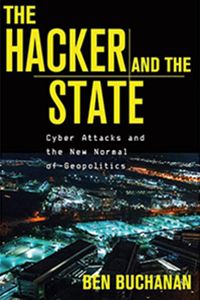
Ben Buchanan, The Hacker and the State: Cyber Attacks and the New Normal of Geopolitics
2020
What role do cyber-attacks play in geopolitics, and how do states operate in cyberspace? Buchanan provides an overview of the most important cyber-attacks of the past decade, as well as a solid theoretical framework aimed at interpreting the role of cyber-attacks in geopolitics. For a long time, cyber-attacks were considered analogous to nuclear warfare: very destructive but rare. We now know that cyber-attacks (espionage, sabotage) have become a ‘new normal’, while it is unclear how destructive they really are. Buchanan analyses how cyber-attacks have become an integral part of the work of intelligence agencies and of geopolitics. The rise of cyber, however, has also changed the world of international politics. While states used to focus on signalling their intentions to others physically, by moving fleets or making political statements, cyber-attacks tend to focus on shaping the other, by spreading misinformation and sabotaging infrastructure. The result is a continuous struggle for domination in cyberspace: “The nation that hacks best will triumph”.
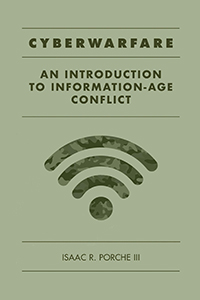
Isaac Porche, Cyberwarfare: An Introduction to Information-Age Conflict
2020
Like Buchanan, Isaac Porche approaches cyber-attacks and cyberwarfare from a geopolitical perspective. But while Buchanan focuses on the way in which states and criminal groups interact, Porche, a former member of the US Army Science Board, focuses on the technologies behind cyber operations. His book introduces key concepts of information age conflict, and discusses the techniques used by cyber warriors. Ultimately, Porche focuses on defensive measures: How can one improve the cyber security of individuals and organizations, and how can one assess if one is vulnerable to cyber-attacks? Porche has written an introductory text to help both “novice and advanced information warfare practitioners”.
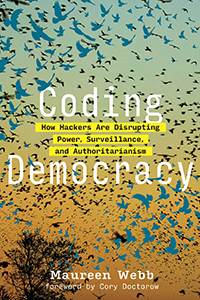
Maureen Webb, Coding Democracy: How Hackers Are Disrupting Power, Surveillance, and Authoritarianism
2020
Digital technology is not just used by states and corporations to further their goals; citizens and social movements also claim their right to cyberspace. In Coding Democracy, human rights lawyer Maureen Webb follows movements like Anonymous and Occupy, and individuals like Edward Snowden, and Chelsea Manning to show how they use technology to speak truth to power. While governments and corporations focus on surveillance and profit, the non-state actors that Webb focuses on choose to unveil illegal activities by others. Webb’s claim is “that users of technology have rights, that technology must serve and not subject humankind, that it is citizens who must ultimately control code, [and] that we can and must code for democracy.” To forward her claim, she shows how activists and movements can use technology to shape politics, develop new ways to mobilize, and form new democratic structures.
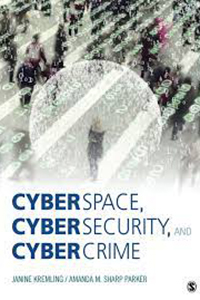
Janine Kremling and Amanda M. Sharp Parker, Cyberspace, Cybersecurity, and Cybercrime
2018
Kremling and Parker approach cyber security from yet another perspective: criminal justice. How should lawmakers, police investigators and judges deal with cybercrime? And what are the legal ramifications of their work? This textbook provides a broad overview of cyberthreats and discusses how they can be combatted. What challenges does cybercrime in the form of hacking, terrorism, and the dark web pose to individuals, businesses, and governments? Kremling and Parker zoom in on the policies that governments, organizations, and criminal justice institutions can adopt, and the legal aspects related to them.
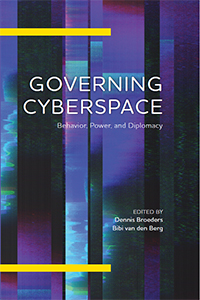
D.W.J. Broeders and B. van den Berg, Governing Cyberspace: Behavior, Power, and Diplomacy
2020
How is cyberspace currently governed, and how should it be governed? How do norms and international law regulate state and corporate behaviour in cyberspace? And what are the limits of these kinds of regulations? This collection of essays investigates exactly these questions and is based on a conference by the The Hague Program for Cyber Norms. Its main aim is to cross disciplinary boundaries and explore the theme of responsible state behaviour in cyberspace: from the international law, international relations, and political science to business studies and philosophy.
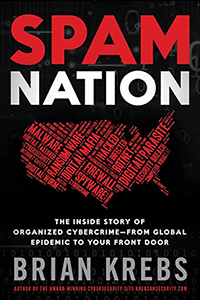
Brian Krebs, Spam Nation: The Inside Story of Organised Cybercrime
2014
For a long time, spam emails were one of the primary ways for criminals to scam individuals. Spam is not only used to sell prescribed or illegal drugs, but also to steal personal data like login credentials, credit card details, etc. But who are the people creating and distributing spam? Former Washington Post journalist Brian Krebs set out to map the digital mafiosi who govern the multi-million-dollar industry of spam and malware, even interviewing them and their opponents; the anti-spam activists. Especially shocking are conversations with people who have responded to spam ads for cheap (and often unreliable) drugs. In the US, many can simply not afford prescription drugs, which drives them into the hands of scammers. Krebs paints a grim picture of criminals using advanced technology to acquire sales and personal data; and of the people who fall victim to their ploys.
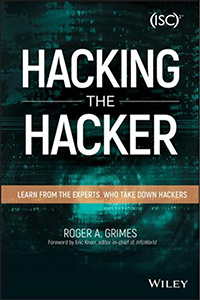
Roger A Grimes, Hacking the Hacker: Learn From the Experts Who Take Down Hackers
2017
The title says it all. Roger Grimes has set out to interview twenty-six high-level cybersecurity experts on their work, the challenges they face and cybersecurity solutions. Rather than providing hands-on information on how you can improve your individual cybersecurity position, Grimes introduces us to the top men and women battling hackers and cybercriminals. In doing so, Grimes shows just how important cybersecurity has become, how hackers exploit our digital weaknesses and who the people are facing these hackers in the digital arena. Clocking in at 275 pages, but containing no less than 50 chapters of technical overviews, interviews and personal profiles, the book offers a solid introduction to the field of cybersecurity and the world of cybersecurity experts.
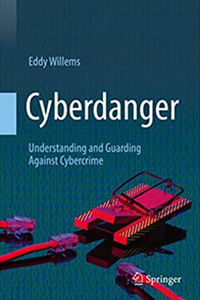
Eddy Willems, Cyberdanger: Understanding and Guarding Against Cybercrime
2019
While the previously mentioned books detail the activities in cyberspace by governments, corporations, cybercriminals, cyber security professionals and social movements, we are left to wonder: how can individuals protect themselves from hackers and cybercriminals? In his book Cyberdanger, Eddy Willems answers exactly this question. After providing a brief history of malware and a discussion of the motivations of those who program it, the book details how individuals (and organizations) can guard themselves against hacking. Written in a colloquial and even humorous style, the book contains many useful tips and insights. Cyberdanger is enlivened by interviews with experts, anecdotes and engaging, contemporary design.
Contact us
Is a book missing on this list, or would you like UBL to purchase a book about cybersecurity that is not yet available in our collections? Contact our faculty liaisons.
